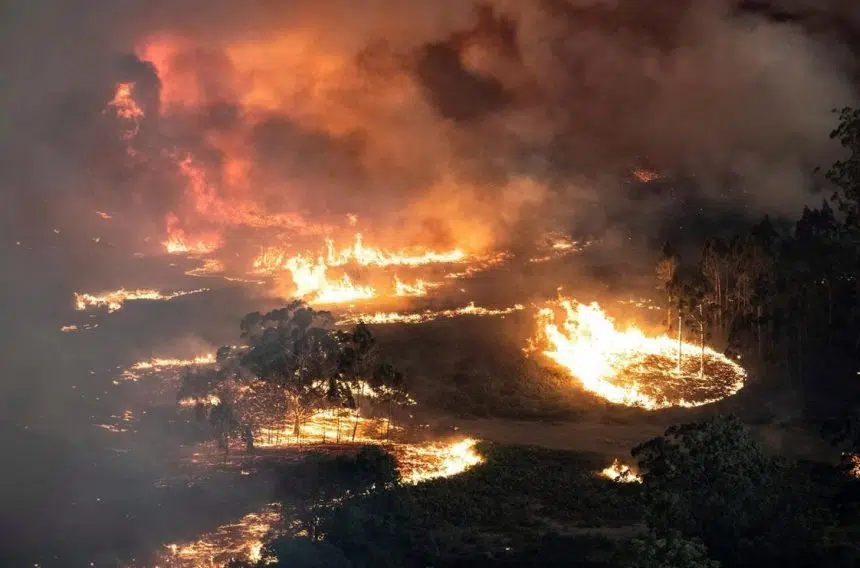PERTH, Australia — Wildfires burning across Australia’s two most populous states Tuesday trapped residents of a seaside town in apocalyptic conditions and killed at least two people while more property along the country’s east coast fell victim to a devastating fire season.
About 4,000 residents in the southeastern town of Mallacoota in Victoria state fled toward the water Tuesday morning as winds pushed an emergency-level wildfire toward their homes. The smoke-filled sky shrouded the town in darkness before turning an unnerving shade of bright red.
Australia’s annual wildfire season, which peaks during the Southern Hemisphere summer, started early after an unusually warm and dry winter. Record-breaking heat and windy conditions triggered devastating wildfires in New South Wales and Queensland states in September.
About 5 million hectares (12.35 million acres) of land have burned nationwide over the past few months, with 12 people confirmed dead and more than 1,000 homes destroyed. Nearly 100 fires were burning across the state of New South Wales, which is home to Sydney.
New South Wales state Rural Fire Services Commissioner Shane Fitzsimmons said this wildfire season is the worst on record and painted a bleak long-term picture.
“We’ve seen extraordinary fire behaviour,” he said Tuesday. “What we really need is meaningful rain, and we haven’t got anything in the forecast at the moment that says we’re going to get drought-breaking or fire-quenching rainfall.”
The wildfire crisis has reignited debate about whether Prime Minister Scott Morrison’s conservative government has taken enough action on climate change. Australia is the world’s largest exporter of coal and liquefied natural gas.
Morrison, whom critics have deemed a climate change skeptic, conceded earlier this month that “climate change along with many other factors” has contributed to the wildfires.
The prime minister took criticism for going on a family vacation to Hawaii in December during the crisis. He eventually cut his trip short and publicly apologized.
Late Tuesday, Mallacoota was saved by changes of wind direction, but authorities said “numerous” homes were lost. Residents returning home were urged to boil tap water before drinking it. Forest Fire Management Victoria said the wildfires had put heavy demands on tap water that is affecting the supply of water.
Stranded residents and vacationers were reported to be sleeping in cars on New Year’s Eve, while gas stations and surf clubs transformed into evacuation areas.
Victoria state Premier Daniel Andrews had earlier announced plans to evacuate the trapped people by sea. There were grave fears for four missing people. “We can’t confirm their whereabouts,” Andrews told reporters Tuesday.
Andrews has requested assistance from 70 firefighters from the United States and Canada, while Australia’s military sent air and sea reinforcements.
Victoria Emergency Services Commissioner Andrew Crisp confirmed “significant” property losses across the region. More than 115 communities across Victoria remained under emergency warnings Tuesday night.
Some communities cancelled New Year’s fireworks celebrations, but Sydney’s popular display over its iconic harbour controversially went ahead in front of more than a million revelers. The city was granted an exemption to a total fireworks ban in place there and elsewhere to prevent new wildfires.
Fire conditions in Victoria and New South Wales worsened after oppressive heat Monday mixed with strong winds and lightning.
Police in New South Wales said Tuesday that two men — a 63-year-old father and 29-year-old son — died in a house in the wildfire-ravaged southeast town of Cobargo, and a 72-year-old man remained missing.
“They were obviously trying to do their best with the fire as it came through in the early hours of the morning,” New South Wales Police Deputy Commissioner Gary Worboys said. “The other person that we are trying to get to, we think that person was trying to defend their property in the early hours of the morning.”
On Monday, a firefighter was killed when extreme winds flipped his truck. Samuel McPaul, 28, was the third volunteer firefighter in New South Wales to have died in the past two weeks. He was an expectant father.
More than 130 fires remain burning across New South Wales, with five at an emergency level. Authorities warned that power would be out for 24 hours along the fire-ravaged south coast of the state.
Tristan Lavalette, The Associated Press







